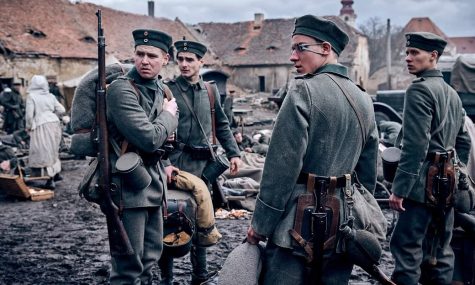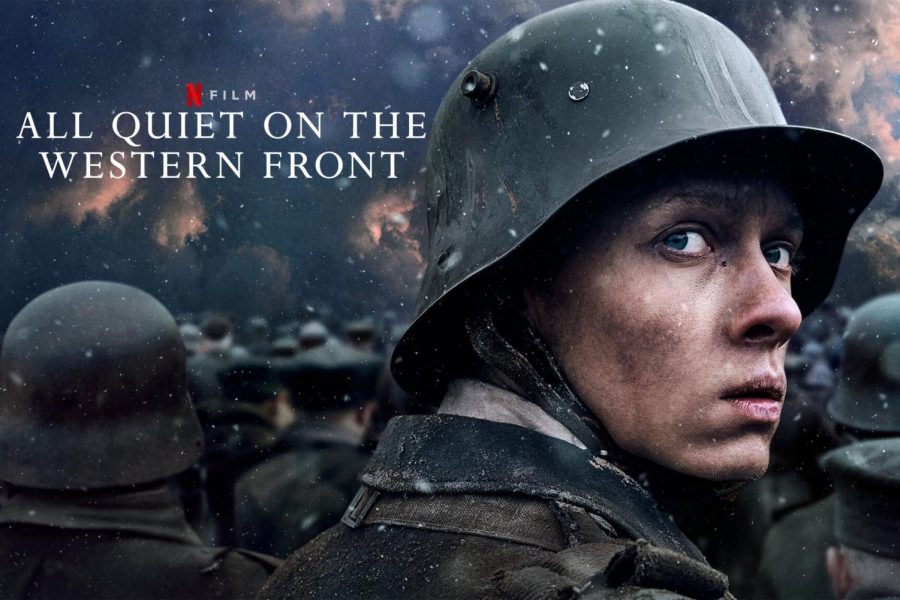One-hundred-year-old WWI novel adapted to film
Germany’s submission for the Academy Award for Best International Feature Film
November 22, 2022
The film 1917, directed by Sam Mendez, was groundbreaking. Its incredible soundtrack and story won three Oscars and seven BAFTA awards, and is now considered one of the best World War I epics. However, on October 28, 2022, Netflix released All Quiet on the Western Front, directed by Edward Berger, and it has the potential to share 1917’s fame. To some, the title All Quiet on the Western Front does not ring a bell, but it’s a story that has been retold since 1929, when Erich Maria Remarque, a World War I veteran, wrote the original novel. In 1930, the German book was adapted into a movie, but was produced by an English production company whose actors sported English accents. It was confusing to associate the German history with a British cast; although, the 2022 film All Quiet on the Western Front is German. All Quiet on the Western Front is an epic that does not rely on bombs and intense action scenes; it thrives off of heavy emotions and the thousand-yard stare.

All Quiet on the Western Front is a story that follows a group of schoolboys who have been misguided by their professor to join the war effort. After parading to the trenches of the western front, and met with French bombardment, they are instantly struck with regret and pure terror. The friends attempt to stay together until the eleventh hour on the eleventh day of the eleventh month: when World War I officially ends.
All Quiet on the Western Front, both from 1930 and 2022, is an extremely dark story, since it lacks heroic embellishment. Unlike 1917, the plot does not surround a heroic mission, nor does it end with a heroism-driven scene; the film is a pain-staking journey through the trenches of the western front. All Quiet on the Western Front has small moments of valor as the friends risk their lives to save one another, but the story does not rely on it, as it does in 1917, when over one thousand lives are entirely dependent on two British soldiers.
The main character Paul Bäumer, and his friends, are ordinary soldiers, which makes All Quiet on the Western Front believable and realistic. The lack of heroism creates an anti-war theme, because it contradicts the patriotism their professor encouraged in the beginning of the movie.
Not only is the anti-war message portrayed through the characters and their experiences, but surprisingly through the soundtrack. Another popular movie about the Great War, War Horse, features a soundtrack composed of pompous and nationalistic instrumentation, produced by trumpets and snare drums. 1917’s soundtrack, however, turned away from classic orchestral music to modernized–and almost mechanical–songs, while also utilizing brass in moments of intense action. All Quiet on the Western Front follows 1917 soundtrack-wise, but takes a step further to completely eradicate the heroic sounds of war bugles and dramatic brass. The title screen is silent, to represent the quietness in which the name represents, but the first song of the film blares like a fog horn. It’s a song that you can’t turn away from, like the story Erich Maria Remarque wrote in 1929; a story of war without glorification. When the soldiers are singing marching songs on their way to the trenches, the soundtrack overpowers their voices, which again subtly implies the anti-war theme by drowning out the patriotism.
All Quiet on the Western Front has been submitted for the Academy Award for Best International Feature Film, and it’s proved itself worthy of it.


